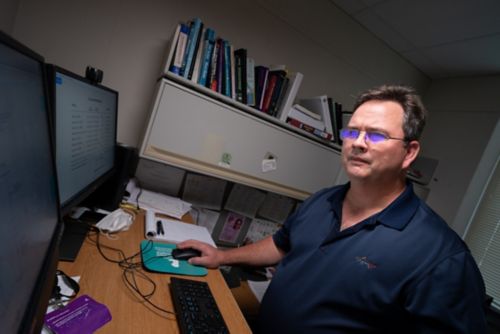St. Jude Family of Websites
Explore our cutting edge research, world-class patient care, career opportunities and more.
St. Jude Children's Research Hospital Home

- Fundraising
St. Jude Family of Websites
Explore our cutting edge research, world-class patient care, career opportunities and more.
St. Jude Children's Research Hospital Home

- Fundraising
Guolian Kang Group
Designing and developing statistical approaches to optimize basic science, clinical, translational, population, and family-based studies
About the Kang Group
A person’s genetic makeup can have a significant impact on the onset, development, and progression of disease. As investigators and clinicians study the genome and its role in pediatric catastrophic disease, a robust statistical approach advances the understanding of genetics, environment, and treatment in relation to disease. Our laboratory provides statistical services and methodology development that support laboratory research, clinical, translational genomics, and precision medicine efforts as we advance cures for pediatric catastrophic diseases.

Kang Group research summary
Our group’s work focuses on the advancement of clinical and laboratory research through the development and application of robust and valid statistical approaches. In this endeavor, we partner with the Department of Hematology to support their research efforts into sickle cell disease and other non-malignant hematologic diseases.
Statistical research
The goal of our independent research is to develop new statistical methods to analyze the diverse forms of mega-genomics and population- and family-based data.
Secondary traits genetic and exposure-secondary outcomes association studies
We propose a novel set-valued (SV) method to assess secondary trait genetic association studies and exposure-secondary outcome association studies using data collected under case-control study design (SV2bc) and extreme phenotype study design (STEPS). Here, secondary traits can be binary or continuous variables and can be associated with gene expression, gene methylation, etc.
Gene-environment (G-E) interactions
We have assessed efficient study designs of gene-environmental (G-E) interaction studies for a binary environmental variable in a case-control study on the power for assessing G-E interactions or for assessing genetic or environmental effects in the presence of G-E interactions.
Rare variants association studies
We have developed set-valued system identification approaches (SVSI) on rare variant association approaches in next generation sequencing studies for binary outcomes and ordered categorical outcomes.
Genome-wide genetic mediation analysis (GMEPS)
We have proposed a fast and versatile genome-wide mediation analysis approach (GMEPS) to analyze data collected under different study designs such as nonrandom Extreme or random Phenotype Sampling design. Here, the mediator can be binary or continuous variables and can be gene expression or methylation data.
Mendelian randomization analysis (MREPS)
We have proposed a versatile and efficient approach for Mendelian randomization analysis under different study designs. They can be random sampling design, extreme tails of the primary outcome of interest, or extreme tails of the risk factor that is the primary outcome of interest in the original study. Here, the risk factor is a continuous variable and can be gene expression or methylation data.
Collaborative research
Sickle cell disease
A major focus for our group is to provide statistical support for the Sickle Cell Research and Intervention Program (SCCRIP). Our work in this area helps investigators assess large datasets from SCCRIP and its coupled sickle cell genomic project using established statistical approaches as well as novel approaches equipped to handle rich sets of phenotypic and genomic data. Much of our clinical collaborative work concentrates on prospective sickle cell disease trials along with retrospective research efforts.
Other non-malignant hematology
We support gene-therapy clinical trials focused on sickle cell disease (SCD) and other non-malignant hematologic diseases by designing, monitoring, reporting clinical trials, and writing manuscripts.
Pre-clinical and translational research
We are active participants in experimental hematology projects and provide statistical support to investigators by designing basic science studies and writing statistical considerations in various grant applications, amongst other activities.
Through our daily work, we analyze a large amount of phenotype data, such as growth development, bone mineral density, kidney, heart, lung, quality-of-life, neurocognitive data, etc, which we then correlate with genomic data parameters by considering environmental and treatment factors. This correlation allows us to establish relationships among genetics, treatment, environmental, hematologic parameters, and outcomes. Our ultimate hope is to develop new statistical approaches to further assess and establish these types of relationships that help the research community understand the impact on patient outcomes and quality of life.
Software packages
Kang Group selected publications
Contact Kang Group
Guolian Kang, PhD
Member
Department of Biostatistics
MS 768, Room R6008
St. Jude Children's Research Hospital

Memphis, TN, 38105-3678 USA GET DIRECTIONS